4 Kapitel 11.1: Subjunctive II
11-1: Subjunctive II (Present)
In German 102, you learned the würde-construction to talk about conditional things—things that you would possibly do if the circumstances worked out.

Conjugation of würden + infinitive (kicked to end)

Ich würde zur Party kommen, aber ich habe zu viele Hausaufgaben.
(I would come to the party, but I have too much homework.)
This does not mean that I will go to the party–only that if I didn’t have so much homework, I would.
Potential for the future that may or may not work out.

Click to review this from the German 102 book:
https://una.pressbooks.pub/german-102/chapter/section-5-proficiency-interviews-5/
EXTRA PRACTICE with würden + infinitve:
https://www.grammatikdeutsch.de/html/konjunktiv-8.html
Watch Easy German’s video on “would you rather…”
Ex. A: Wiederholung. Was würden Sie in den folgenden Situationen machen?
→Ich würde…
-
 2.
2.
 4.
4.
 6.
6. 
 8.
8. 
In the exercise above, you used a würde-construction. There is also another way to do this called the subjunctive. Unfortunately, it’s a little more complex, so we usually don’t speak with it. You CAN speak with it if you like, but it’s mostly found in writing…with a few exceptions. (Sort of like the conversational past (das Perfekt) vs. simple past (das Präteritum), which you learned in Chapter 8.
How to make the one-word subjunctive form:
- Find the simple past of the verb. (Need a review of simple past? Find it here: PRÄTERITUM.)
- Then…decide whether the verb is regular/weak or irregular/strong.

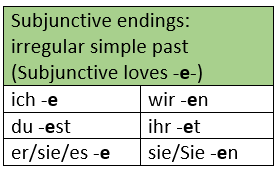
The following examples show how the würde-construction that you’ve been using can be replaced with the subjunctive (one word) to have EXACTLY THE SAME MEANING.
Beispiel: Ich würde fragen, aber ich habe Angst.
- Simple past of fragen = ich fragte
- This is regular/weak.
- According to the chart, the subjunctive is the same as the simple past, so “Ich fragte,” will be your answer in the subjunctive.
Beispiel: Wir würden den Fisch bestellen, aber er riecht komisch.
- Simple past of bestellen = wir bestellten
- This is regular/weak.
- According to the chart, the subjunctive is the same as the simple past, so “wir bestellten” is the subjunctive.
Beispiel: Er sagte, er würde zur Party kommen.
- Simple past of kommen = er kam
- This is irregular/strong.
- According to the chart, we must add an umlaut to the simple past (if possible) → er käm
- Now we add the –e– ending from the chart →er käme
Beispiel: Ich wünschte, du würdest nicht so laut singen.
- Simple past of singen = du sangst
- This is irregular/strong.
- According to the chart, we must add an umlaut to the simple past (if possible) → du sängst
- AND then we add the –e– ending between the stem and ending→du sängest
Beispiel: Wäre ich du, würde ich das nicht machen.
- Simple past of machen = ich machte
- This is regular/weak.
- According to the chart, the subjunctive is the same as the simple past, so “ich machte” is your answer.
Beispiel: Ihr würdet schneller laufen, aber ihr seid müde.
- Simple past of laufen = ihr lieft
- This is irregular/strong.
- According to the chart, we must add an umlaut to the simple past (if possible); it’s not possible. Still “ihr lieft.”
- THEN we add the –e– ending between the stem and the ending→ihr liefet

Ex. B: Tabelle. Fill in the table with the correct form of the verb.
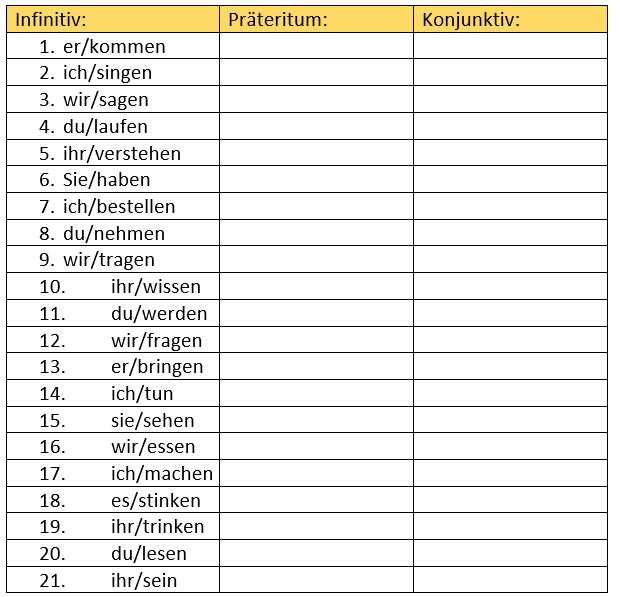

Listen to the short audio clip of Nora from AudioLingua describing her family. Was hätte sie gern?
Watch this video by YourGermanTeacher to see examples and explanations of the subjunctive with haben, sein, and werden:
Frage: But how do I know when to use würden + infinitive or to follow the long chart? They both mean the same thing, don’t they?
Antwort: Yes, they both mean the same thing. In spoken German, the würde-construction is used most of the time except for a handful of verbs, such as sein, haben, and werden.

Watch Easy German’s video to see an explanation of the 10 verbs that Germans usually don’t use the würde-construction with.
Modal Verbs:
Modal verbs are never used with the würde-form. You will always use the short form. Fortunately, they have a pattern.

Pattern: In the simple past for modal verbs, you took the Umlaut away. In the subjunctive, put it back on…IF it originally had one in the infinitive.
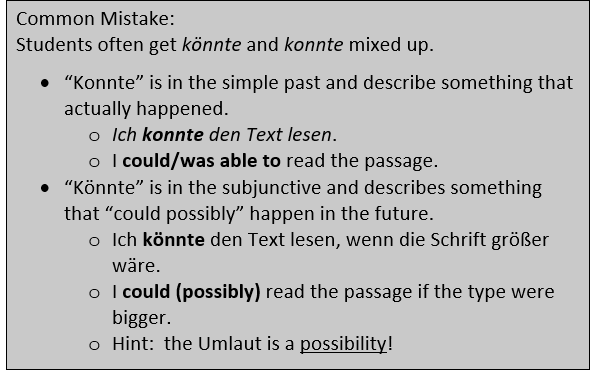
Ex. E: Was sollten wir machen? Beschreiben Sie fünf Probleme, die Sie im Moment haben. Sprechen Sie mit ihren Mitstudierenden und machen Sie Vorschläge im Konjunktiv.
Beispiel: Ich habe kein Geld.
→Du solltest nicht so viel Geld für Kleider ausgeben. Du könntest einen neuen Job finden. Du könntest Geld von deiner Mutter borgen….usw.

Quick Listening: Was würden Joe und Johanna, AudioLingua, machen, wenn Sie die Welt verändern könnten? Hören Sie sich ihre Ideen an und vergleichen Sie sie mit Ihren eigenen Ideen. Würden sie auch so machen, oder hätten Sie andere, bzw. besser Pläne für die Welt?
Ex. F: Nicos Weg. Episode 47: Frauensache? Gucken sie das Video und machen Sie die Online-übungen.

https://learngerman.dw.com/en/frauensache/l-38214849
Listen to Santiano’s song, Doch ich weiß es (2017), to hear several examples of subjunctive.
Songtext: https://www.songtexte.com/songtext/santiano/doch-ich-weiss-es-g13e79dc1.html
Being polite: Use the subjunctive!
In previous chapters, you’ve learned that bitte can help make a request more polite. So can using the subjunctive. Compare.
Can you help me? Vs Could you help me?
The same thing works in German.
Kannst du mir helfen? Vs Könntest du mir helfen?
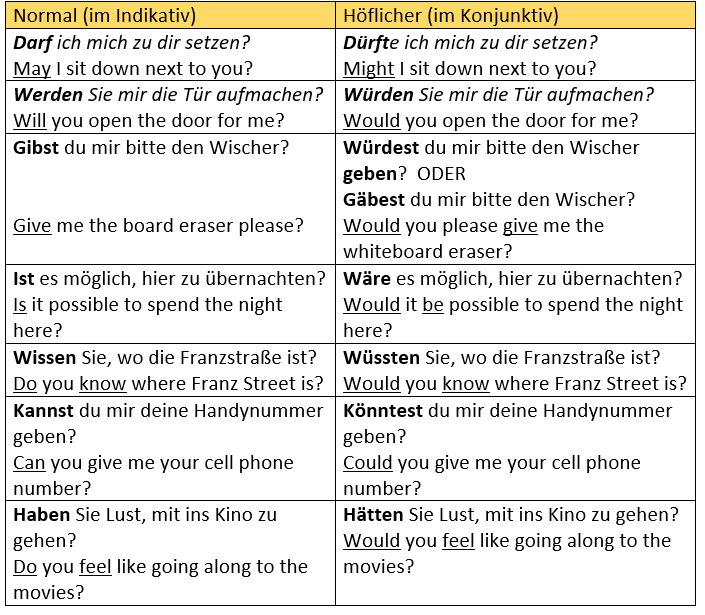
Long story short→Especially in formal settings, more polite language is always better…job interviews, restaurants, people in stores; just be polite, and you’ll get better service.
 For example, the phrase “Ich hätte gern ________,” which you learned in Chapter 4 for ordering food in a restaurant is actually subjunctive II used to make your order more polite.
For example, the phrase “Ich hätte gern ________,” which you learned in Chapter 4 for ordering food in a restaurant is actually subjunctive II used to make your order more polite.
In addition, “ich möchte________,” which you learned in Chapter 3, is actually the subjunctive form of mögen. It makes your order more polite.
We can do this with any verb, but it’s very often done with modal verbs.

Watch Easy German’s video on how to sound more polite with subjunctive II:
Ex. G: Noch höflicher, bitte! Benutzen Sie den Konjunktiv, um die Gespräche noch höflicher zu machen.
Auf der Reise
Klaus: Katrin, kannst du mir bitte den kleinen Koffer geben?
Katrin: Den hier? Bitte schön.
Klaus: Sollen wir das Reisebüro anrufen? Ich fürchte, wir kommen zu spät am Flughafen an.
Katrin: Ja, das ist keine schlechte Idee. Komm, wir müssen schon unterwegs sein.
* * *
Am Telefon
Angestellter: Guten Tag!
Thomas: Guten Tag. Hier spricht Thomas Fritsche. Ich habe gestern ein Doppelzimmer gebucht. Ist das Frühstück im Preis inbegriffen?
Angestellter: Ja. Haben Sie weitere Fragen?
Thomas: Dürfen wir nach dem Check-out unser Gepäck bei Ihnen im Hotel lassen? Unser Flug ist erst am Abend.
Angestellter: Das ist kein Problem.
* * *
Am Bahnhof
Touristin: Entschuldigung? Wissen Sie, wieviel Uhr es ist?
Mann: Ja, Moment. Fünf nach elf.
Touristin: Oje, mein Flieger geht um zwölf. Können Sie mir sagen, ob es ein Taxi in der Nähe gibt?
Mann: Nein, nicht, dass ich weiß. Wenn Ihr Flug um elf Uhr losfliegt, müssen Sie sich auch mit dem Taxi beeilen. Vielleicht sollen Sie den Flug lieber umbuchen.
Touristin: Das ist aber problematisch, weil mein Sohn heute Abend heiratet.
Mann: Wo findet die Hochzeit statt?
Touristin: In Mainz.
Mann: Dann brauchen Sie nur in den nächsten ICE-Zug einzusteigen. Er fährt direkt nach Mainz.
Touristin: Vielen Dank! Wiedersehen!
Ex. H: Nicos Weg. Episode 48: Damals. Gucken Sie das Video und beantworten Sie die Online-Fragen. Sie wiederholen das Präteritum.
https://learngerman.dw.com/en/damals/l-38214756
Expressing wishes: Use subjunctive.
German also uses the subjunctive to express wishes.
Ich wünschte, es würde regnen.
(I wish, it would rain.)
Ich wünschte, du wärst freundlicher.
(I wish, you were [would be] friendlier.)
Ich wünschte, wir hätten mehr Zeit.
(I wish we had [would have] more time.)
Ich wünschte, du würdest mir öfter in der Küche helfen.
(I wish you would help me more often in the kitchen.)
NOTE that the part after “ich wünschte” is ALWAYS in the subjunctive. That is because this is contrary to what reality actually is. I wish that something WOULD happen, but there’s no guarantee that it actually will happen.

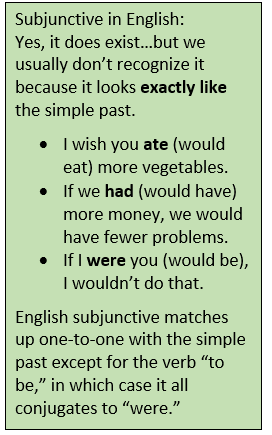
Ex. I: Wünsche. Diskutieren Sie mit Ihren Mitstudierenden.
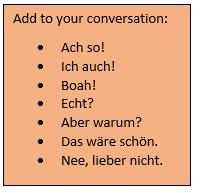
A: Was wünschen Sie?
B: Ich wünschte, wir hätten _________.
ODER
B: Ich wünschte, ich wäre _________.
ODER
B: Ich wünschte, du würdest __________.
Ex. J: Marcels Wünsche, um die Welt zu verändern. Marcel, AudioLingua, wünschte, er könnte die Welt verändern. Welche Verben hören Sie im Konjunktiv?
Ex. K: Nicos Weg. Episode 49: Berufswahl. Schauen Sie sich die Episode an und machen Sie die Online-übungen. Sie wiederholen den Unterschied zwischen denn und weil.
https://learngerman.dw.com/en/berufswahl/l-38215363
WIEDERHOLUNG: Take a moment to review reflexive verbs with Claudia Kost’s and Crystal Sawatzky’s (University of Alberta) activity:
Review subjunctive II with this video:
Contrary to fact; use subjunctive II.
For statements that are contrary to fact, use the subjunctive. Why? Because you’re talking about some condition that does not exist and the possibility of what might happen if it did.
- If he did/would do his homework, he would get a better grade.
- Wenn er seine Hausaufgaben machte, würde er eine bessere Note bekommen.
ODER
- Wenn er seine Hausaufgaben machen würde, hätte er eine bessere Note.
- If we weren’t so tired, we would come to your party.
- Wenn wir nicht so müde wären, würden wir zu Ihrer Party kommen.

Frage: Does the wenn-clause always have to come first?
Antwort: Nein! Put it last if you want.
- He would get a better grade, if he did his homework.
- Er bekäme eine bessere Note, wenn er seine Hausaufgaben machte.
ODER
- Er würde eine bessere Note bekommen, wenn er seine Hausaufgaben machen würde.
- We would come to your party, if we weren’t so tired.
- Wir würden zu Ihrer Party kommen, wenn wir nicht so müde wären.

Ex. L: Was wäre, wenn…? Beschreiben Sie die Bilder. Was würde passieren, wenn alles anders wäre?
Beispiel: Wenn der Student in den Unterricht kommen würde, (dann) hätte er eine bessere Note. ODER Wenn der Student in den Unterricht käme, (dann) hätte er eine bessere Note.




Ex. M: Wie wäre Ihr Leben anders? Diskutieren Sie das Thema Leben mit Ihren Mitstudierenden. Was könnten Sie anders machen? Was würde passieren?
Listen to Nena’s song, Schön wär´ es doch (1986), to hear examples of subjunctive.
https://genius.com/Nena-schon-war-es-doch-lyrics
WIEDERHOLUNG: Don’t forget about comparative and superlative. Go here to review it. Then try this review by Claudia Kost and Crystal Sawatzky, University of Alberta.
Ex. N: Nicos Weg. Episode 50: Bewerbung. Schauen Sie sich die Episode an und beantworten Sie die Online-Fragen.
https://learngerman.dw.com/en/bewerbung/l-38227164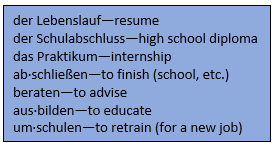
Ex. O: Das Lotto. Was würden Sie machen, wenn Sie im Lotto viel Geld gewinnen würden? Wie wäre Ihr Leben anders? Diskutieren Sie mit Ihren Mitstudierenden!
Ex. P: Nicos Weg. Episode 51: Ist die Stelle noch frei? Schauen Sie sich die Episode an und machen Sie die Online-übungen. Sie wiederholten den Konjunktiv, bzw. höfliche Ausdrücke.

https://learngerman.dw.com/en/ist-die-stelle-noch-frei/l-38228687
EXTRA PRACTICE: Present subjunctive II.
- https://www.grammatikdeutsch.de/html/konjunktiv-7.html
- https://www.germanzone.org/subjunctive-mood-present-tense-1/
- https://www.germanzone.org/subjunctive-mood-present-tense-2/
- https://www.germanzone.org/subjunctive-mood-present-tense-3/
- https://www.germanzone.org/subjunctive-mood-present-tense-4/
- https://www.germanzone.org/subjunctive-mood-present-tense-alternative-wurde-1/

